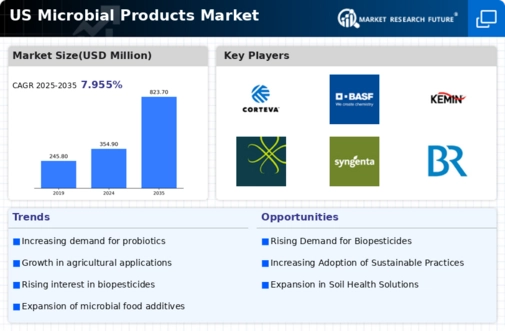Expansion of Biopesticide Market
The US microbial products market is experiencing a significant expansion in the biopesticide segment, driven by the increasing demand for environmentally friendly pest control solutions. Biopesticides, which are derived from natural materials, are gaining popularity as they offer a sustainable alternative to chemical pesticides. The biopesticide market in the US is projected to reach USD 4 billion by 2027, reflecting a robust growth trajectory. This expansion is likely to be fueled by consumer preferences for organic produce and the need for integrated pest management strategies. As more farmers adopt biopesticides, the US microbial products market is expected to see a corresponding increase in the development and commercialization of innovative microbial solutions that address pest challenges while promoting ecological balance.
Government Regulations and Support
The US microbial products market is significantly influenced by government regulations and support aimed at promoting sustainable agricultural practices. The Environmental Protection Agency (EPA) has established guidelines that encourage the use of microbial products as biopesticides and biofertilizers. These regulations not only facilitate the approval process for new microbial products but also provide financial incentives for farmers adopting these technologies. The USDA has also launched initiatives to support research and development in microbial applications, which could enhance the efficacy and safety of these products. As a result, the regulatory landscape is likely to foster growth in the US microbial products market, encouraging innovation and adoption among agricultural stakeholders.
Increased Awareness of Soil Health
The US microbial products market is benefiting from a growing awareness of soil health among farmers and agricultural professionals. There is a rising recognition that healthy soil is fundamental to sustainable agriculture, and microbial products play a crucial role in maintaining soil biodiversity and fertility. Educational programs and workshops are being conducted to inform farmers about the benefits of microbial applications, leading to increased adoption rates. According to the Soil Health Institute, approximately 60 percent of US farmers are now implementing practices that enhance soil health, which includes the use of microbial products. This trend is likely to drive growth in the US microbial products market as more farmers seek effective solutions to improve soil quality and crop productivity.
Rising Demand for Organic Products
The US microbial products market is experiencing a notable surge in demand for organic products. Consumers are increasingly inclined towards organic farming practices, which utilize microbial products to enhance soil health and crop yield. According to the USDA, organic farming has seen a growth rate of approximately 20 percent over the past five years. This trend is likely to continue as more consumers prioritize sustainability and health. The integration of microbial products in organic farming not only improves crop resilience but also aligns with the growing consumer preference for environmentally friendly practices. As a result, the US microbial products market is poised to benefit from this shift towards organic agriculture, potentially leading to increased market share and innovation in microbial solutions.
Technological Advancements in Microbial Research
The US microbial products market is witnessing rapid technological advancements in microbial research, which are enhancing product efficacy and application. Innovations in genomics and biotechnology are enabling the development of more targeted microbial solutions that can address specific agricultural challenges. For instance, the use of synthetic biology to engineer microbial strains for improved nutrient uptake is gaining traction. This could potentially lead to higher crop yields and reduced reliance on chemical fertilizers. The market for microbial products is projected to grow at a compound annual growth rate (CAGR) of 10 percent over the next five years, driven by these technological advancements. As research continues to evolve, the US microbial products market is likely to see an influx of novel products that cater to diverse agricultural needs.



















